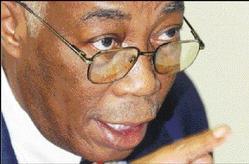By Robert Hart, Staff Reporter
Nicholson: The question now is are we going to say allow the police to their own devices. - File
JUSTICE MINISTER A.J. Nicholson is admitting that the country's Police Force is constrained in its ability to provide top-class investigations when carrying out its duties.
Mr. Nicholson, who is also the Attorney-General, was speaking during yesterday's sitting of the Joint Select Committee examining the Fingerprint Amendment Act, 2003. He made a case for the police to be given more powers in respect to their ability to fingerprint persons, in their fight against crime.
"It is said and obviously acknowledged that the investigative process or processes in Jamaica... are hampered by certain things. It is also acknowledged that regardless of how we strive to fix that, we are not going to be able, as a developing country, to find all of the resources to have a state-of-the-art situation," he said.
HOW TO CONTROL POLICE POWER
He continued: "The question now is, are we going to say allow the police to their own devices, some say battering a man or whatever and get something out of him, or on the other hand, give a power (the right to fingerprint) with enough safeguards to eliminate that sort of thing."
The committee heard submissions from the Jamaica Bar Council, the Norman Manley Law School and the Farquharson Institute. Representatives of each group expressed reservations about the proposed amendments to the legislation governing the use of fingerprints in the investigation of crimes.
Jacqueline Samuels-Brown, member and representative of the Bar Council, said the fundamental issue raised by the Bill was that the proposed changes to the law would impact on several constitutional rights.
"In that context, the changes should only be made to the extent that they are reasonably necessary. Not to the extent that they are permissible in a democratic society, but to the extent in the Jamaican context that they are necessary," she emphasised.
Mrs. Samuels-Brown added: "I have heard nothing which suggests that it is necessary to take it (the power to order fingerprinting) out of the hands of a judicial officer, in whom it is best reposed, and put it in the hands of a police officer."
She suggested there was a danger in that the high levels of criminal activity can pressure police officers into engaging in excesses while carrying out their duties. As a result, she argued that it was unfair to the police to put the burden of such authority on them.
FINGERPRINT QUESTIONED
Frank Phipps, Q.C., chairman of the Farquharson Institute, questioned both the legality of some of the changes identified in the Bill and the reliability of fingerprint evidence on a whole.
Norman Davis, Course Director at the Norman Manley Law School, told the committee that the Bill, if passed, may be abused by the police to take persons into custody unlawfully for the sole purpose of taking their fingerprints.
"We cannot ignore the widespread practice in Jamaica of unlawfully detaining persons without reasonable suspicion and it is important that the Bill does not give more latitude for this," he added.
However, Mr. Nicholson said the country must approach the legislation in a context in which it is ensured that the adopted changes avoid infringing on "the constitutional provisions".
But the potential absence of adequate safeguards is exactly what concerns the representatives offering views on the Bill, which seeks to give police the authority to order the fingerprinting of suspects held without charge. The Bill would also allow the photographing of suspects.




























